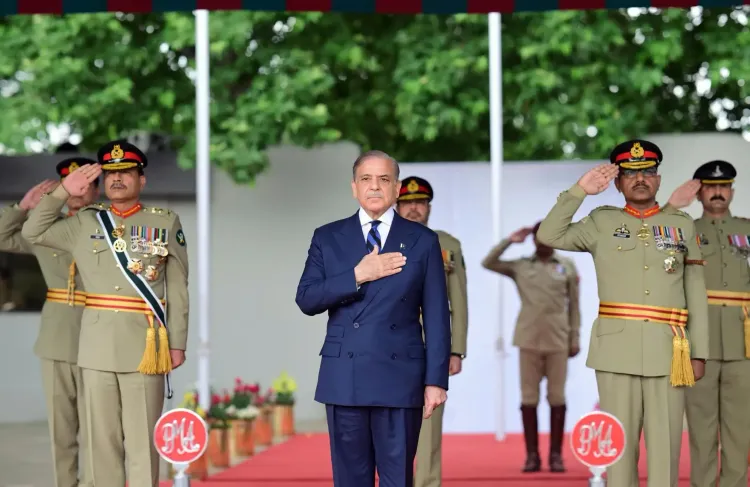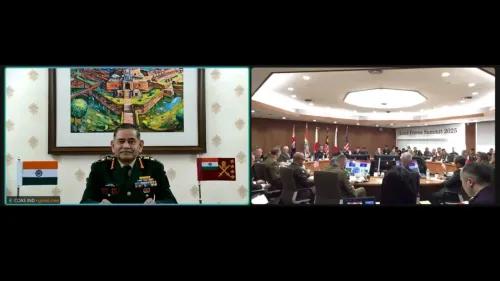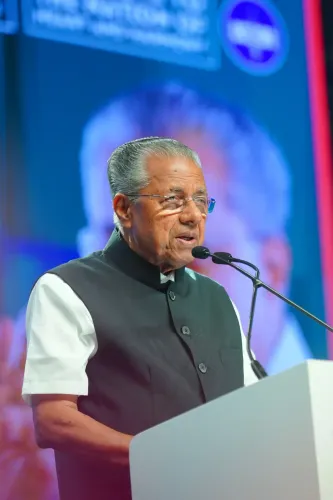Does the Pakistani Military's Obsession with Grandeur Endanger the Country?

Synopsis
Key Takeaways
- Pakistan's military delusion threatens national stability.
- Generals prioritize militarized nationalism over democracy.
- Asim Munir's rise reflects a historic pattern of military control.
- Military interventions have weakened Pakistan’s governance.
- Citizens must advocate for sovereignty and accountability.
Islamabad, Oct 25 (NationPress) The delusion of grandeur within Pakistan's military poses a significant threat, not only through external miscalculations but also due to its internal decline. The Generals’ fixation on magnificence distracts them from the harsh realities faced by an economically strained and climate-vulnerable populace, as highlighted in a report published on Saturday.
“The elevation of Asim Munir to Field Marshal and his sustained influence over Pakistan’s political and institutional realms signify not a revival of national resilience but a worsening of a longstanding issue — the military’s grandiosity that has consistently undermined the nation’s prospects for stability and advancement,” the report from India Narrative explained.
Following in the footsteps of previous Army Chiefs like Ayub Khan, Zia-ul-Haq, and Pervez Musharraf, Munir embodies the military’s conviction that salvation is found not in democracy or development, but in a militarized nationalism that prioritizes the soldier over the citizen and paranoia over pragmatism.
“For seventy-five years, Pakistan’s generals have portrayed themselves as the protectors of a fragile state, intervening to ‘rescue’ it from civilian shortcomings. From Ayub Khan’s coup and Zia’s Islamization to Musharraf’s 'Enlightened Moderation,' each military intervention was justified as a patriotic necessity — and each has left the nation weaker, poorer, and more frustrated,” the report noted.
The report emphasized that, under the guise of national pride and Islamic fortitude, Munir’s ascent to Field Marshal in 2025 dramatically underscored that the true center of power in Islamabad resides behind the khaki curtain of Rawalpindi’s General Headquarters.
“Munir’s carefully crafted image as a pious general — a memorizer of the Qur’an and moral guardian — resonates well in a society steeped in religio-military nationalism. However, it obscures a fundamental truth: that Pakistan’s generals, intoxicated by their perceived divine mission, have repeatedly confused personal authority with state strength. The consequence has been an unending cycle of authoritarianism cloaked in ideology, leading to both political stagnation and economic devastation,” it asserted.
The tragedy of Pakistan under Munir, the report contended, lies in its duplicity—a republic in name, yet a garrison in practice, with civilian administrations functioning merely as extensions of military will. The judiciary bends to the pressures of “national security” while the media endures constant repression.
The report revealed that Munir’s latest maneuvers — including a ten-year extension plan to cling to power until 2035 — showcase the military’s belief that “Pakistan’s salvation” lies in “continuity of command” rather than “constitutional accountability.”
“Unless the citizens of Pakistan reclaim sovereignty from military control, the nation will continue to be a tragic stage of militarized hubris — where generals envision empires while their country struggles under debt, disillusionment, and decay. Munir’s rule, although adorned with the pomp of a Field Marshal, will likely be remembered not for victories achieved but for opportunities squandered — a continuation of Pakistan’s longest, most destructive delusion: that salvation wears a uniform,” it concluded.










